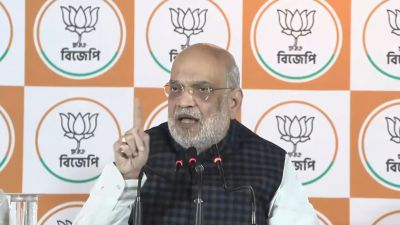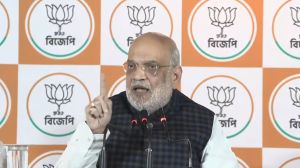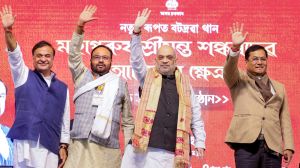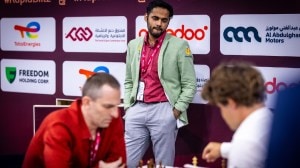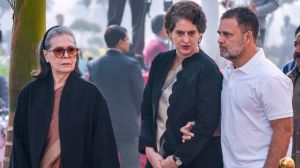Talk is cheap8230;get going!
PUNE, June 10: Each year, when schools begin after the summer break and the roads start groaning again under the weight of overloaded auto...

PUNE, June 10: Each year, when schools begin after the summer break and the roads start groaning again under the weight of overloaded autorickshaws crammed with schoolchildren, the authorities begin issuing notifications, press releases and ambitious statements that vow to bring some discipline into the highly dangerous system of school transportation in the city. This seems almost a routine procedure.
And then, just as the movement begins to gain momentum, raising the hopes of anxious parents and concerned citizens, the drive is suddenly called off, the fizz behind the enthusiasm disappears and the roar of the authorities concerned changes into an apologetic whimper.
A week of verbal promises, few days of holding talks with rickshaw unions, some hours spent reviewing the situation and always, but always, it is back to square one. Within days, the traffic police and the Regional Transport Authority RTA end up turning their back on this issue to divert their energies towards other less demanding civic issues. Which is precisely what seems to have happened even now. Just as the much-hyped campaign of the traffic police was beginning to take effect, came the news that it had been just an awareness campaign and had little to do with clamping down heavily on errant drivers. Nevertheless, the fact remains that the school transport system in the city, dominated by three-seaters, continues to be fraught with danger.
8220;The blame lies firmly and squarely at the parents8217; doorstep,8221; asserts Aroona Nafday, activist and Express Citizens8217; Forum executive member. 8220;Had they shed their apathy and acted collectively, this issue would have been solved long back. Even if the authorities do decide to crack down on three-seater operators ferrying more than six students, they are inevitably forced to pull back because of parental pressure.
8220;Parents must think of viable cost-effective alternatives if they want their children8217;s safety. You cannot ask schools to initiate action as schools are responsible for the children8217;s safety after they enter its gates, not before. If need be, parents must pay more but they should not send their child in a three-seater ferrying more than six children.
8220;Interestingly, every time this issue crops up, not a single politician comes up with a statement. These children desperately need a saviour. Some years ago, there were no parents8217; association in the city to take up the issue. Today, we have such associations and they are even getting vocal. But mere academic perusal of the problem is not enough 8211; they have to force the administration into taking stern action.8221;
Action is what the five-year-old Parents8217; Association Action Committee, headed by Padmaja Sane, is gearing up for 8211; once it can formulate a strategy and a clear stand on the issue. 8220;However, we do intend to stand by the rule of six children per three-seater and 12 per six-seater, as emphasised by the Regional Transport Office RTO and the police. We have urged schools to look at the two new models of Swaraj Mazdas designed especially for schools, and opt for them over rickshaws. It8217;s wrong to assume that parents are supporting these rickshaws. In fact, they are even ready for a fare hike provided it is not more than Rs 50 per month. We will have a meeting of all our representatives from the 10 schools that come under our association and decide on a course of action,8221; says Sane, adding that the association intends to do something constructive this year towards finding a solution.
quot;Which is more than what the official authorities are willing to say in the matter, despite all the hoopla of the past 10 days when it seemed as though the official whip was to crack down on the offending parties. While Additional Commissioner of Police M S Maheshgouri poured cold water over all hopes by declaring that the police was only trying to educate the public about the dangers rather than planning any concerted action, Regional Transport Officer R S Lodhe, too, insists that the authorities are going to merely continue with routine checking rather than take any new initiatives as of now. quot;DCP Prakash Pawar echoes Maheshgouri8217;s statements, emphasising that the latter8217;s statements clearly reflect the stance adopted by the police at present. 8220;This is a sensitive issue and a social problem involving many sections of society. We have to proceed gradually, without interfering in the children8217;s education. Action will be taken but how and when is undecided,8221; adds another senior official of the traffic policebranch.
This ambiguity is probably just what the various unions were looking for when they submitted their memorandum to Maheshgouri on June 8, asking for a breather. 8220;Six children per three-seater is certainly not viable. We have asked for the limit to be raised to 10, that is a safe number. At least right now, the officials should refrain from taking any action against rickshaws. Instead, they should initiate a dialogue with us on the matter. We had intimated the administration that if it continues with its tough stance, we would launch an agitation from Sunday,8221; reveals M V Akolkar, president of the Pune city and district Indian Trade Union Congress.
8220;The authorities will have to stop believing that all rickshaw drivers are criminals,8221; continues Nitin Pawar, spokesman, Rickshaw Panchayat. 8220;There is no logic in the RTA8217;s diktat of six children per three-seater. An adult weighs as much as three children do, so 10 children per rickshaw is a perfectly acceptable number.
quot;This is a very complex issue, which is why, in 1994, Balasaheb Mali, the then divisional commissioner, had suggested that a sub-committee be formed under the leadership of Baba Adhav to look at this problem from all angles. But nothing happened. Let this sub-committee take shape, hold daily meetings with the concerned parties and then arrive at a sensible solution, rather than this arbitrary one. quot;With around 6,000 rickshaws plying on the school route in the city, each carrying an average of 12 children and some engaged in double shift, we are talking about two to two and a half lakh students who commute daily by three-seaters. Surely the government does not want to inconvenience them by some arbitrary ruling?8221;
With the police putting up their hands and displaying reluctance to enforce the norms strictly 8211; at least for the time being, the unions presenting an aggressive stance, and the school authorities and parents adopting a wait-and-watch attitude, the issue continues to seem irresoluble. Even as many innocent children continue to be subjected to high risk everyday, twice a day, as they make their way to and from school packed in a vehicle that falls woefully short of safety standards.
- 01
- 02
- 03
- 04
- 05


